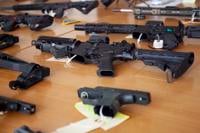House Approves Gun Law Changes On 120-38 Vote
Debate Shows Divide Over Whether Proposal Will Curb Gun Violence

STATE HOUSE, BOSTON, OCT. 18, 2023…..Most House Democrats lined up Wednesday in support of a major overhaul of the state’s firearms laws, easily hurdling over procedural complaints and sending the Senate a measure that has generated incendiary criticism from gun owners and promises from supporters that it will save lives.
The House voted 120-38 on wide-ranging legislation (H 4135) that prohibits firearms in some public spaces, expands the state’s “red flag” law, seeks to crack down on the spread of ghost guns with new registration requirements, updates the statewide ban on assault weapons, and streamlines the licensing process.
House roll call on gun reform bill, Oct. 18, 2023
A dozen Democrats joined the full Republican caucus in opposition: Reps. Shirley Arriaga of Chicopee, Brian Ashe of Longmeadow, Colleen Garry of Dracut, Patricia Haddad of Somerset, Kathleen LaNatra of Kingston, Christopher Markey of Dartmouth, Rady Mom of Lowell, David Robertson of Tewksbury, Aaron Saunders of Belchertown, Alan Silvia of Fall River, Jeffrey Turco of Winthrop and Jonathan Zlotnik of Gardner. Independent Rep. Susannah Whipps of Athol also voted against the bill.
Representatives made a handful of changes to the more than 120-page legislation over the course of four-plus hours of debate, which alternated between impassioned calls for action to save lives and dire warnings that the measure would infringe on constitutional rights.
They unanimously agreed to an amendment making clear that the bill does not ban off-duty police officers from carrying firearms in certain restricted spaces, so long as the weapon is provided by their department. The legislation originally allowed only active, on-duty police to wield guns in those locations.
Rep. Mark Cusack of Braintree, the Democrat who filed the amendment, said it was meant “to clarify that off-duty active law enforcement officers would be allowed to carry their department-issued firearms in the following places … first, a place owned, leased or under the control of state, county or municipal government and used for the purpose of government administration, a location in use at the time of possession as a polling place and for the storage or tabulation of ballots, and third in elementary schools, secondary schools, college or university, including transport used for the students.”
House Democrats shot down without any debate an amendment from Republican Rep. Michael Soter of Bellingham that would have dramatically stripped down the bill to just a few main provisions, such as prohibiting someone who is intoxicated from carrying a firearm, restricting modifications that enable automatic fire, limiting untraceable firearms, and collecting more data about guns in Massachusetts.
Rep. Michael Day, the Stoneham Democrat who authored the landmark bill and a predecessor version, introduced the measure by rattling off a long list of past gun restrictions policymakers approved dating back to 1632, when the Massachusetts Bay Colony “prohibited individuals from carrying loaded firearms without proper authorization.”
Massachusetts has the lowest rate of firearms fatalities in the contiguous United States, but reform supporters argued Wednesday that the problem of gun violence is still potent enough to warrant additional action, particularly amid the increasing presence of untraceable “ghost guns.”
Since July 1, Day said, the state has experienced 90 shootings that killed 40 Bay Staters and injured 86 others.
“We are in the midst of a public health crisis and it is unrelenting,” he said. “Thoughts and prayers are not enough. As Abigail Adams said, we have too many high sounding words and too few actions that correspond with them. It’s time for the House to once again act in this area and ask for your support on this bill.”
House Democrats first unveiled a sweeping gun reform bill in the summer with plans to seek a vote by the end of July, but after facing pushback from opponents and questions from representatives, Speaker Ron Mariano punted the deliberations into the fall.
Mariano and his deputies resurfaced an updated version of the bill 13 days ago and brought it forward following a public hearing at the State House.
Senate Democrats have said they also want to ship a gun reform bill to the desk of Gov. Maura Healey this session. They are crafting their own measure behind closed doors and did not participate in development of the version the House approved Wednesday.
Rep. Peter Durant, a Spencer Republican who will face off against Zlotnik in a Nov. 7 special election for an open Senate seat, said he sees only “one goal” in the legislation.
“When the listening tours were going on, when we were having the informational sessions, when this bill was being written, we were all told that the legal gun owner is not the not the target here. We’re not going after them,” Durant said. “But it certainly seems to be that that’s exactly what we’re doing.”
Republican Rep. David Muradian of Grafton said he understood the need for action last year to bring Massachusetts into compliance with the U.S. Supreme Court’s Bruen decision, which struck down a concealed-carry law in New York, as well as the value of reining in ghost guns.
“Heck, if we wanted to have an honest and well-intentioned conversation around having to qualify to receive your [license to carry] or your [federal identification], I would have been open to that dialogue. Unfortunately, this legislation is an egregious infringement on all lawful gun owners, and frankly, all residents of the commonwealth of Massachusetts,” Muradian said. “I have had interactions with hundreds if not thousands of constituents within my district on this matter. The resounding question remains: what is the new proposal trying to solve?”
“We’ve heard the data since July 1, but we didn’t hear how many incidents were by someone who is lawfully owning that gun and someone who is illegally possessing that gun,” he added. “That’s because the data doesn’t fit the narrative.”
Some Democrats voiced confidence not just in the necessity of the legislation, but in its constitutionality, too.
“I can assure you that every single line of this bill is in accordance with the Bruen decision, is in accordance with the Heller decision, and don’t think for a moment that this bill goes too far,” said Rep. David Linsky of Natick.
At one point, Day said some bill opponents have responded to the measure with racist “dog whistles” claiming that shootings only take place in “certain neighborhoods committed by the criminal element.”
“One caller among many callers to my office said, ‘Now, I’m not a racist, but these guns aren’t getting up to shoot themselves.’ Always good to start with ‘now, I’m not a racist, but…'” Day said. “You know what the ‘but’ is? The ‘but’ is we know that these shootings, while overwhelming in impacted communities, are not limited to them.”
The legislation became a top priority for representatives in the Black and Latino Legislative Caucus, whose communities are disproportionately affected by gun violence. In 2020, the Massachusetts rate of firearm deaths among Black men was more than four times as high as among white men.
Several representatives spoke about their personal experiences over the course of debate. Republican Rep. Alyson Sullivan-Almeida of Abington, who delivered a speech from the House floor with her newborn strapped to her chest, recalled having a “firearm held to me by my abuser.”
Rep. Carlos Gonzalez, a Springfield Democrat, told his colleagues about his own encounter with tragedy.
“In 1982, Angel Rivera, a college graduate and a teacher at [the] Morgan School in Holyoke, Massachusetts, a father of two, was able to buy an illegal gun like buying candy on the street corner,” Gonzalez said. “Angel Rivera, like many others today facing a mental health crisis, took his life, leaving behind two young children. Angel Rivera was my mother’s oldest boy. Angel Rivera was my brother.”
Republicans opened Wednesday’s debate with a parliamentary objection, taking aim at the atypical process Democrats used to bring the measure to the floor.
House Minority Leader Brad Jones contended that because the Ways and Means Committee advanced the bill as a report in part of a fiscal year 2023 closeout budget, it was subject to an internal House rule requiring publication of a summary describing the amount of proposed spending.
No such “fiscal note” exists in the current document, which Speaker Ron Mariano’s team muscled forward following a single House-only committee hearing.
Jones said he expects some portions of the bill to incur significant costs, such as requiring Massachusetts State Police to inspect firearms dealers and expanding access to extreme risk protection orders.
“We do ourselves a disservice as an institution to really hold up that this isn’t going to cost anything,” Jones said on the House floor. “I get that there are people that love this bill and people that hate this bill, but for anybody to think this is not going to cost the taxpayers of the commonwealth any money — [you] cannot do so with a straight face. We should be better. We deserve better as an institution.”
House Speaker Pro Tempore Kate Hogan shot down Jones’s point of order, and Democrats lined up behind that decision in a subsequent roll call vote.
[Colin A. Young contributed reporting.]




